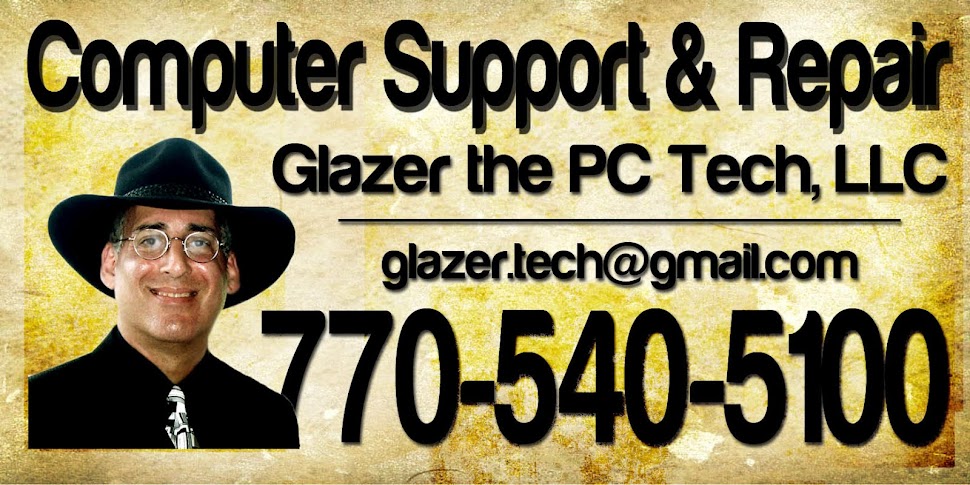arthur@glazerthepctech.com
Computers are magnets for junk files. There are those that Windows needs temporarily and neglects to discard; there are browser histories; installation files and just plain old junk.
Everyone has old e-mails and programs that we once couldn’t do without, but haven’t used in months. Then there are the space hogs, the music and video files. Keeping your system junk-free will help keep it fast.
Just because you put your unused items in the recycle bin doesn’t get them off of your system. You just put the trash in the can, but haven’t taken it out to the curb yet. You need to empty it. Although keeping files in the bin until you know they are truly not needed is a good precaution, you have the option of deleting your trash immediately. Right-click on the Recycle Bin and choose Properties and check the option to empty it.
Even if you delete of all of the above, a good cleaning utility will still find megabytes of garbage on your computer.
It’s not just a matter of keeping it fast; it is also a matter of security. What remains behind after you are done with it, prying eyes may find. There are browser searches, cookies, run commands, the prefetch folder and forms you filled out, some with sensitive information.
You can clean all that manually by clicking this and that, but you need to know where to look, and junk data is hidden in many places. You’d be better off getting a utility to do it for you.
There are dedicated programs to scrub your system, as well as some suites. As always, many can be downloaded for free.
I like CCleaner, a freebie that attaches to your Recycle Bin. You right-click on it to run and in one fell swoop, it cleans a good bit of your junk files then empties the trash can. It can be customized to keep the cookies you want. Get it from www.ccleaner.com/download.
My new favorite tool is a free multi-purpose program from Comodo. System Cleaner is a thorough, easy-to-use utility, available at http://system-cleaner.comodo.com/download.html.
It has a Power Clean option that doesn’t miss a thing. It also checks your registry. Another one is Advanced System Care, that does the same thing as CCleaner and also checks the registry. Download it at www.iobit.com/advancedwindowscareper.html.
There are lots of others. Just Google, "cleaning utility." Remember, just because it is a free download, doesn’t necessarily mean it is a free program. It may be, but read the fine print.
If you are really cleaning your hard drive to make more room, there are other things to consider. Be careful what you delete; some items you may want to keep or at least burn to CD or DVD or move to an external hard drive. Some of those videos, music files, photos or programs you purchased may be irreplaceable.
If you’re a photographer or an audiophile, you could free up many gigabytes by transferring those files to another medium. Just having one copy of something you cherish is never a good idea anyway. You wouldn’t want to lose that shot of your son hitting a homer or your daughter’s solo on stage would you?
Hard drives fail. It is a fact of computing. Dupe those images and tunes to a second disc while you’re at it.
Aside from what’s mentioned above, another big space hog is fonts. Some systems have dozens of fonts that are never used. Removing some will also speed up your boot time.
If you wonder how full your computer is, hover your mouse over your "C" drive icon and it will tell you. If you want to see a pie chart, right-click on it and go to Properties.
When you’re done cleaning your system of unnecessary files, run whatever defragmenting tool you have. It will help keep your computer running fast. It likes contiguous free disc space and when you delete as much as we’ve just talked about, there will be lots of gaps in the file structure.
If you don’t have a third-party defrag application installed, go to Programs, Accessories, System Tools then to Defragmenter to use the Windows tool.
If you really want to get serious about it and you’ve had your computer for 4-5 years or more, reformat your hard drive and start all over. Really. I do it annually, at least. There’s nothing like a clean installation of Windows.
To give you an idea of how much "stuff" is on your hard drive: XP uses about 6 to 7 gb of space and Vista maybe 10 gb. Most of the rest that shows on that pie chart is stuff you could either delete or copy to another disc. Doing it that way, you wouldn’t have to delete a thing. After you copy what you need (and there are back-up programs too), reformatting will erase everything for you.
So whether you reinstall Windows or just do some heavy housekeeping, your computer will run faster.
Arthur Glazer is a freelance writer and computer technician in Gainesville. His column appears biweekly. Arthur welcomes your computer questions and ideas for future columns.


No comments:
Post a Comment
Got a Comment - or a quick question...